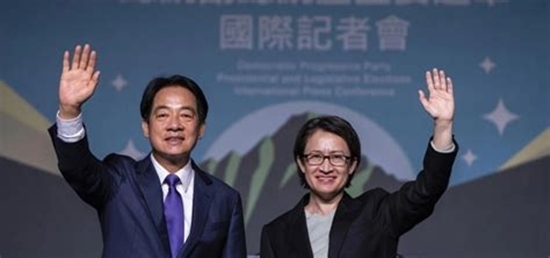
“No matter what, we’re gonna get you, Taiwan,” is the postelection message of the Chinese Communist Party.
The candidate for the presidency of Taiwan that China least wanted to win on January 13, Democratic Progressive Party candidate Lai Ching-te, won with a plurality of about 41% of the vote.
Lai won despite months of blaring efforts by the CCP to entice or scare Taiwanese voters into lurching away from him.
Clement Tan of CNBC reports:
China dismissed the outcome of Taiwan’s Saturday elections, saying its ruling Democratic Progressive Party does not represent mainstream public opinion after it failed to win a majority in the presidential and legislative votes.
“Taiwan is China’s Taiwan,” Chen Binhua, the spokesperson for the Taiwan Affairs Office of the State Council, said on Saturday after DPP’s Lai Ching-te emerged as the winner of the self-governing island’s presidential contest with more than 40% of the popular vote.
“This election cannot change the basic pattern and the development of cross-Strait relations, nor can it change the common desire of compatriots on both sides of the Taiwan Strait to draw closer,” Chen added, according to a CNBC translation of a report from Xinhua, the official state news agency.
So, no big deal. Elections, schmelections; this kind of quaint ritual can’t alter the “basic pattern” or the “common desire” of “compatriots” to “draw closer.” The future has been superglued into place. Free will is a myth, and men are puppets on strings manipulated by the CCP.
But if Taiwan’s election is meaningless and can have no effect on anything, why did the CCP subject the Taiwanese to so many exhortations and so much military prancing in the Taiwan Strait in hopes of preventing Lai’s election?
A plurality is sufficient to win the presidency of Taiwan. With three major candidates drawing votes and other issues in addition to whether Taiwan should resist or “draw closer” (submit) to China also motivating voters, that Lai did not manage a majority is unremarkable.
One of the election-related facts that Chen Binhua pretends doesn’t mean anything pertains to the professed views of Lai’s opponents. However more likely they would have been to appease China as president, as candidates they felt obliged to tell voters that they too would maintain Taiwan’s ability to defend itself from China and had no plans to surrender Taiwan to China.
Hou You-yi, the Kuomintang candidate for president, has said that “Taiwanese independence has no legal basis, so I oppose it.” That’s gibberish, but he has also said that he rejects China’s “one country, two systems” formula for integrating Taiwan, the dishonest formula that failed to protect Hong Kongers.
And just before the election, Hou took pains to distance himself from former Taiwan president Ma Ying-jeou after Ma babbled that Taiwan can “never win against China” and that Taiwanese must place their trust in the Chinese dictator, Xi Jinping.
Ma sparked controversy as he told Deutsche Welle in an interview on Saturday that “as far as cross-strait relations go, you have to” trust Chinese President Xi Jinping.
The former president also said he does not believe Xi is pushing for unification, and advocated for reducing the defense budget and conscription period, as Taiwan could not win in a conflict with China….
New Taipei City Mayor Hou You-yi, the party’s presidential candidate, at an international news conference in Taipei yesterday continued to distance himself from Ma’s comments by telling reporters he would not talk about unification if elected….
“Former president Ma and I have very different positions on certain issues. If I am elected, I will not touch on issues regarding unification with China. When it comes to cross-strait issues, we cannot rely on goodwill from one side. It would be very dangerous if we have absolutely no preparation before addressing them,” Hou said.
So although Hou told voters that the DDP “is pushing Taiwan to the brink of war” (for being explicit about the fact that Taiwan is an independent country), he also told voters that as president he would not be greasing the wheels of a Chinese takeover of Taiwan.
Some Taiwanese voters, then, may have felt that despite their rhetorical differences, Lai, Hou, and Ko Wen-je of the Taiwan People’s Party were more or less on the same page with respect to the sovereignty of Taiwan and resistance to China.
That’s wrong. CCP officials rightly believed that candidate Lai would be less likely, as president, than the other candidates to submit to China’s demands. But it is also wrong to conclude or pretend to conclude from the fact that three fifths of the voters picked someone else that those three fifths of the voters are all closet “compatriots” eager to relinquish the freedom and democracy of Taiwan to the untender mercies of the mainland.





